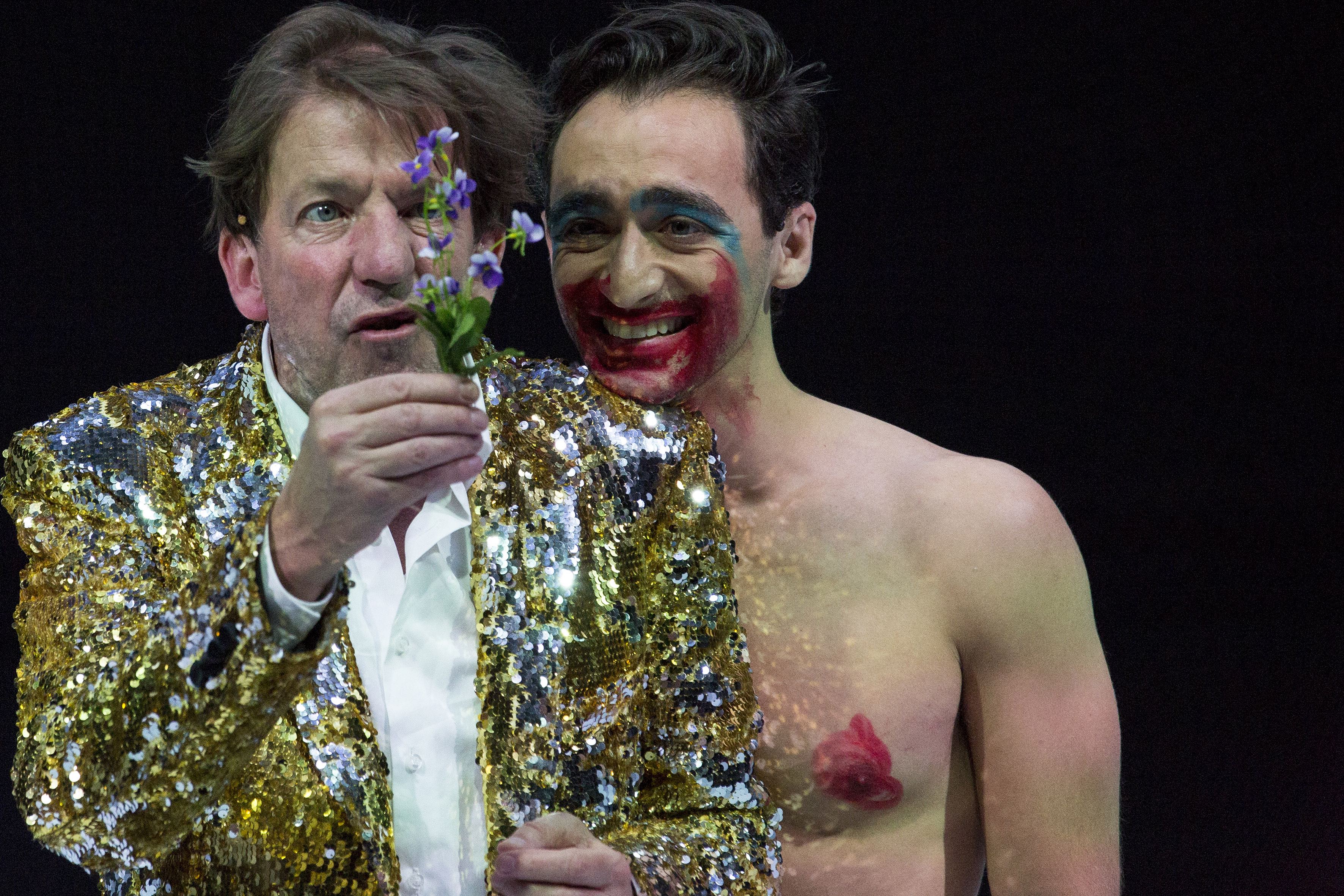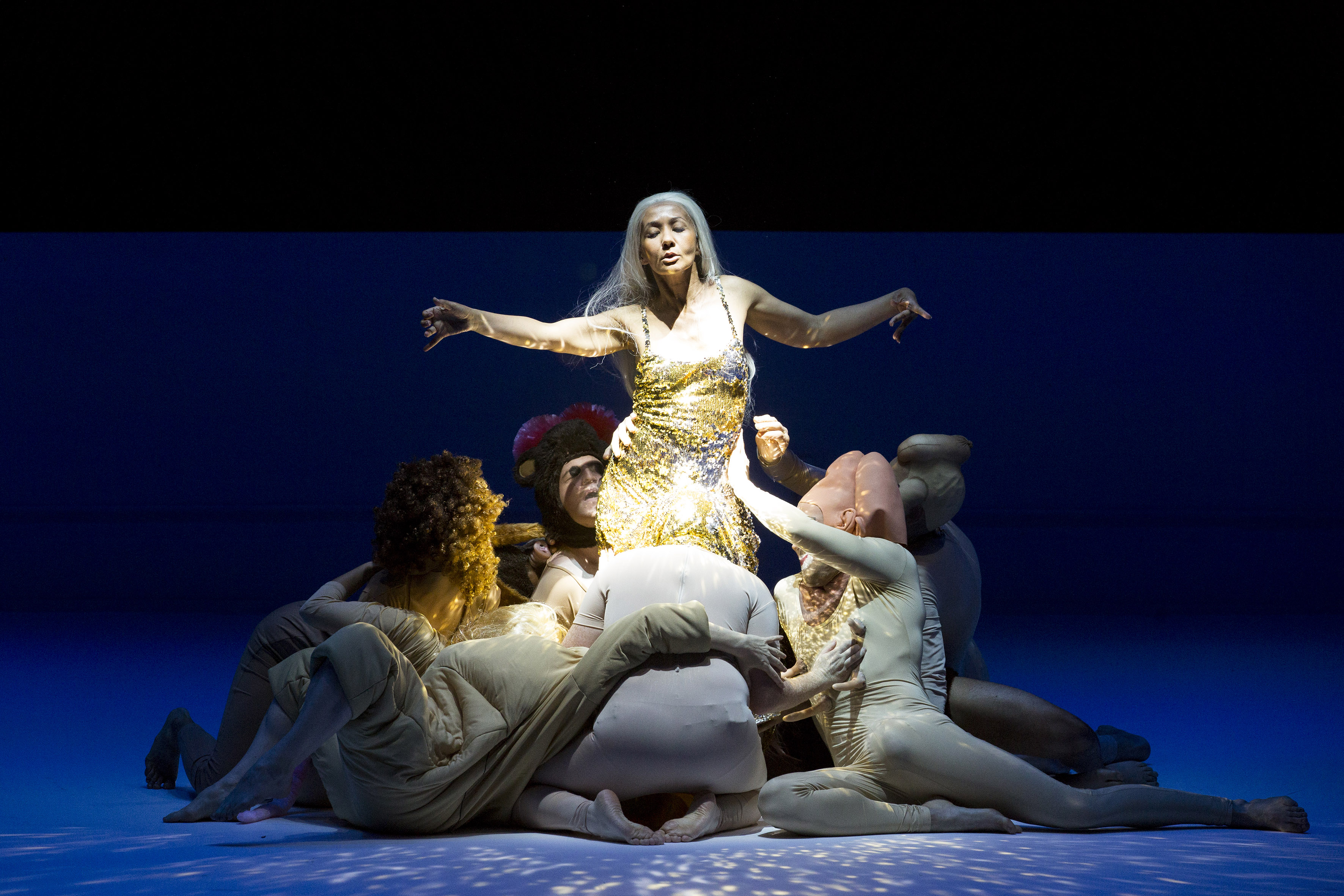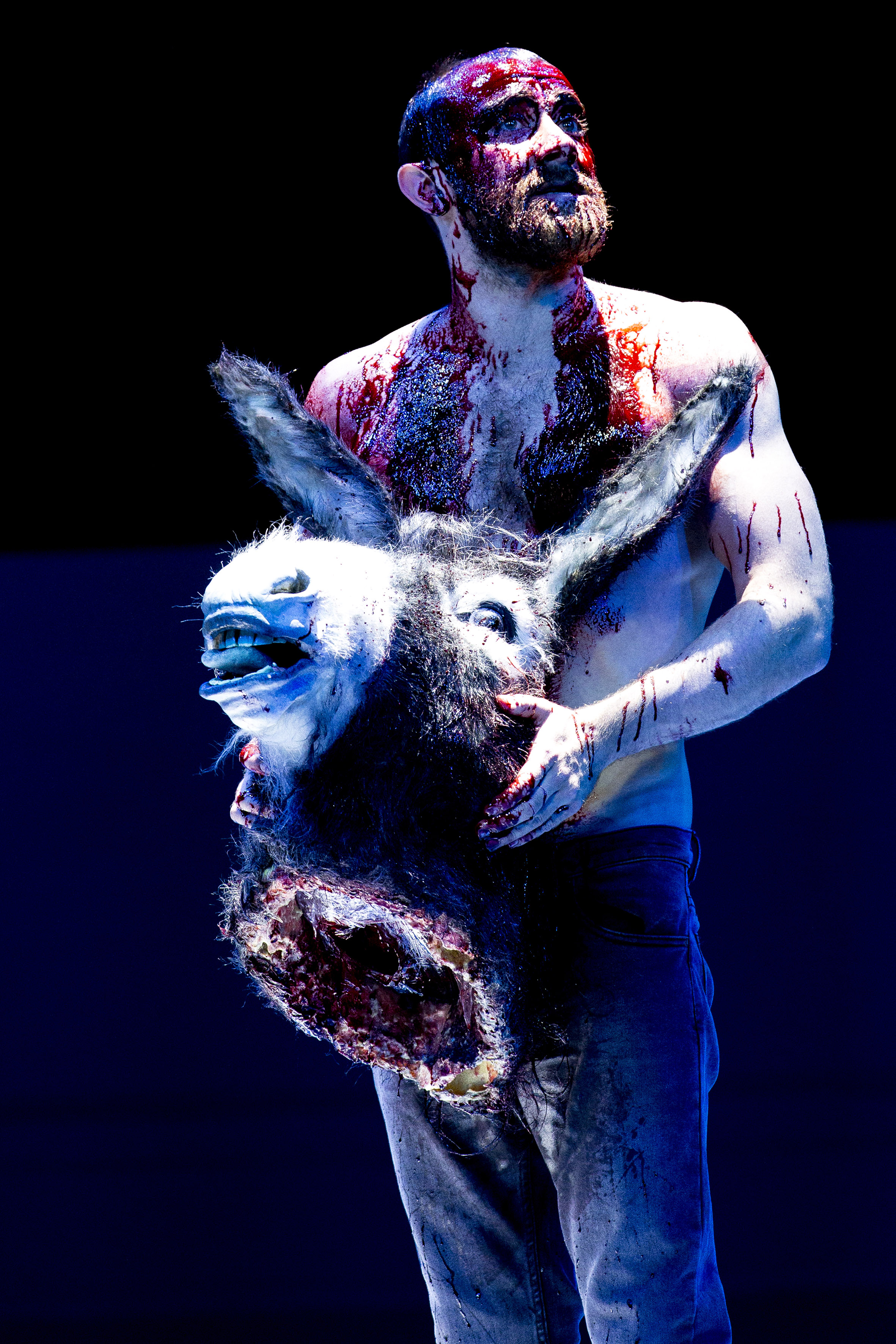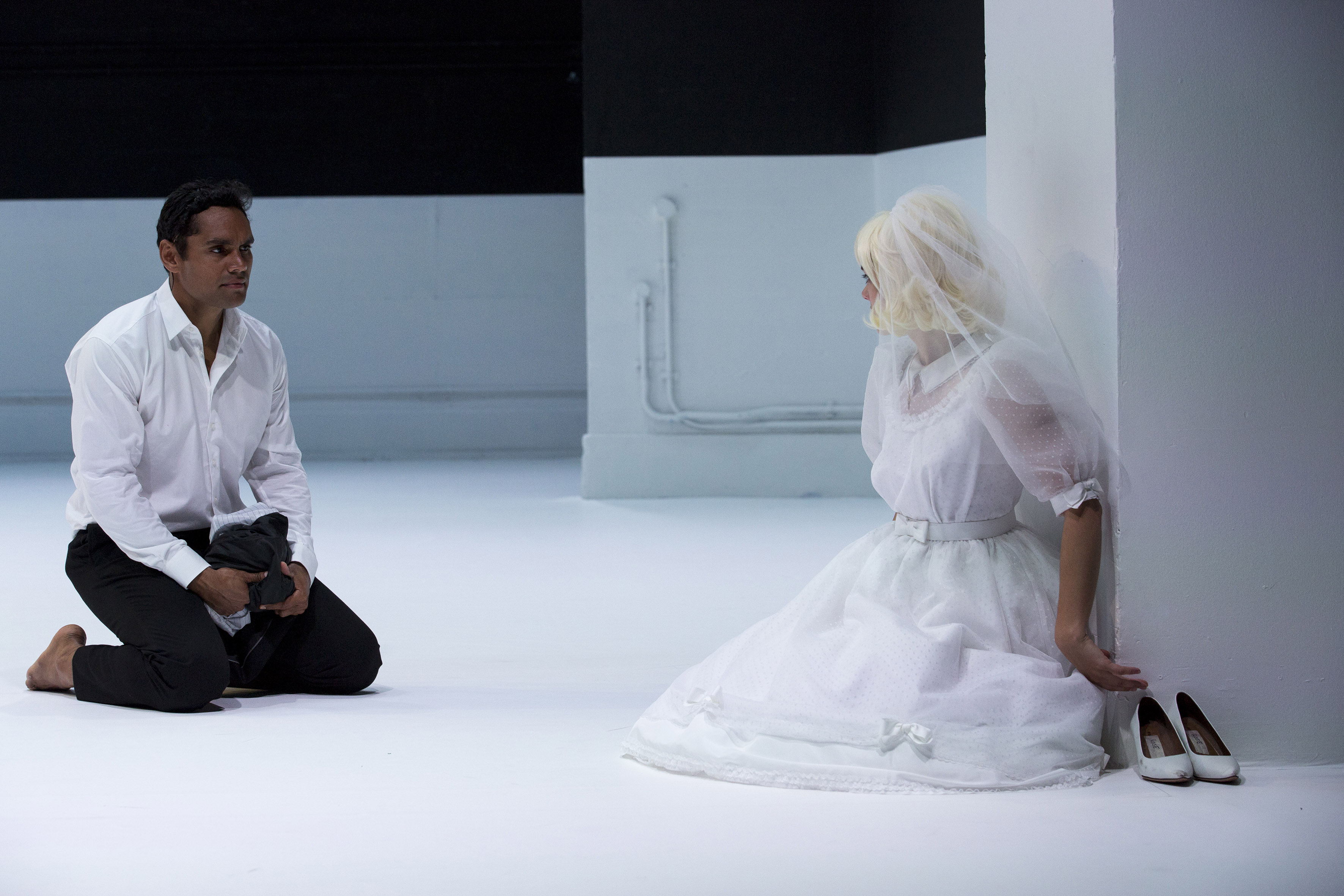★★★½☆ Kip Williams’ Dream leans more to tragedy than mirth in his first production as Interim Artistic Director.
Sydney Opera House, Drama Theatre
September 16, 2016
“Very tragical mirth” is the way Peter Quince describes Pyramus and Thisbe – the play within a play – in Sydney Theatre Company’s new production of A Midsummer Night’s Dream. But it is more to the tragic than the mirth that Kip Williams leans in his first production since being named interim Artistic Director, as he explores the more troubling ideas about sexuality, power and consent that emerge from Shakespeare’s text.
Brutal flashes of light and sound open this stark vision of Shakespeare’s comedy, retina-searing blasts illuminating a male dancer in black sequined underwear (who later turns out to be Matthew Backer as Puck) writhing to a sad rendition of Gershwin’s Summertime – a musical motif that returns throughout the play.
 Robert Menzies as Oberon and Matthew Backer as Puck, photo © Brett Boardman
Robert Menzies as Oberon and Matthew Backer as Puck, photo © Brett Boardman
Williams’ Athens is a dystopic nightmare, Robert Cousins’ set a stark black and white space. Theseus (Robert Menzies) and Hippolyta (Paula Arundell) appear in wedding garb like a mocking cake-topper. A dark council of men in black suits or executioner’s hoods preside in a courtroom setting, led by a stern, unbending Menzies. The women – all in white, dragging around bouquets – are submissive, bowed by the restrictive hierarchical society. Lines like Egeus’s “As she is mine, I may dispose of her” are given a sense of menace that is often overlooked. From the start the audience seems wrong-footed, expecting comedy, even laughing nervously at lines they know are funny in other productions. Lysander’s suggestion that Demetrius should marry Hermia’s father is delivered by Rob Collins with bitter sarcasm rather than played for laughs and he and Hermia (Rose Riley) discuss their imminent flight on their knees.
 Paula Arundell as Tatiana surrounded by fairies, photo © Brett Boardman
Paula Arundell as Tatiana surrounded by fairies, photo © Brett Boardman
Backer’s Puck is mischievous and knowing – he introduces himself smearing lipstick across his face and around his nipples. Arundell and Menzies are also Titania and Oberon (the doubling of these parts a vogue begun by Peter Brook in 1970). Titania’s gold-sequined dress splinters light across the stage, bathing the otherwise bare walls and floor in magic. The fairies are childish and misshapen, bedecked with tumorous growths that suggest udders and genitalia. There are threats implicit in the way Menzies plays Oberon, and a pall of imminent sexual violence overhangs much of the play, as the lovers chase each other across the barren stage. Riley’s Hermia wakes from a nightmare with chilling screams and Helena (Honey Debelle) brings a vivid intensity to the role as she implores Brandon McClelland’s Demetrius to “use me as your spaniel.”
 Josh McConville as Nick Bottom, photo © Brett Boardman
Josh McConville as Nick Bottom, photo © Brett Boardman
The Mechanicals’ rehearsal becomes a much-needed release valve, though their comedy is by no means free of sexual politics. Casting Susan Prior as Peter Quince gives the actors’ hierarchy an interesting twist. Suddenly Bottom (played with gusto by Josh McConville) is mansplaining theatre to Quince – telling her what “women can’t abide.” The other actors are dubious about her ideas until Bottom presents them as his own. This soon descends, however, into Bottom’s bloody transformation at the hands of Puck.
Despite the darker undercurrents, there are still opportunities for laughter – Puck’s capering and the slapstick orgasms that accompany the flower-juice anointings get some laughs, as does Helena’s lecturing Hermia while swatting off the fawning Lysander and Demetrius, all four losing their clothes one piece at a time.
 Robert Collins as Lysander and Rose Riley as Hermia, photo © Brett Boardman
Robert Collins as Lysander and Rose Riley as Hermia, photo © Brett Boardman
Williams chooses not to shy away from the consequences of the action, however. Titania’s discovery of what she has done – or what has been done to her – is heartrending, and when the four lovers return to Athens there is little joy in their weddings. They watch Pyramus and Thisbe stonily and Menzies creates an exquisite awkwardness in Theseus’s enthusiasm for the play.
The dialogue that begins “Methinks I see these things with parted eye” is repeated again after the play’s conclusion, the lovers returning to their forest sleeping positions as Oberon blesses the house – a hint that the ‘happy’ ending and absurd performance of Pyramus and Thisbe was the dream.
While Williams’ production delves into many of the more uncomfortable facets of Shakespeare’s play, plumbing ideas that are usually either overlooked or wilfully ignored, the production doesn’t quite gel as a whole, teetering between comedy and tragedy without committing fully to one or the other. The frightening dystopia of the early scenes, saturated in overwrought sound, isn’t quite reflected in the Athens of the finale, and there is a sense that the action disintegrates into dream-like absurdity rather than following a logical arc.
Nonetheless, Williams presents a fascinating interpretation of A Midsummer Night’s Dream that asks an important question: Why have we, for hundreds of years, laughed at a play in which the action is driven by a husband who drugs his wife – causing her to commit sexual acts she would never otherwise consent to – to win a domestic argument?
Sydney Theatre Company’s A Midsummer Night’s Dream is at the Sydney Opera House until October 22











Comments
Log in to join the conversation.